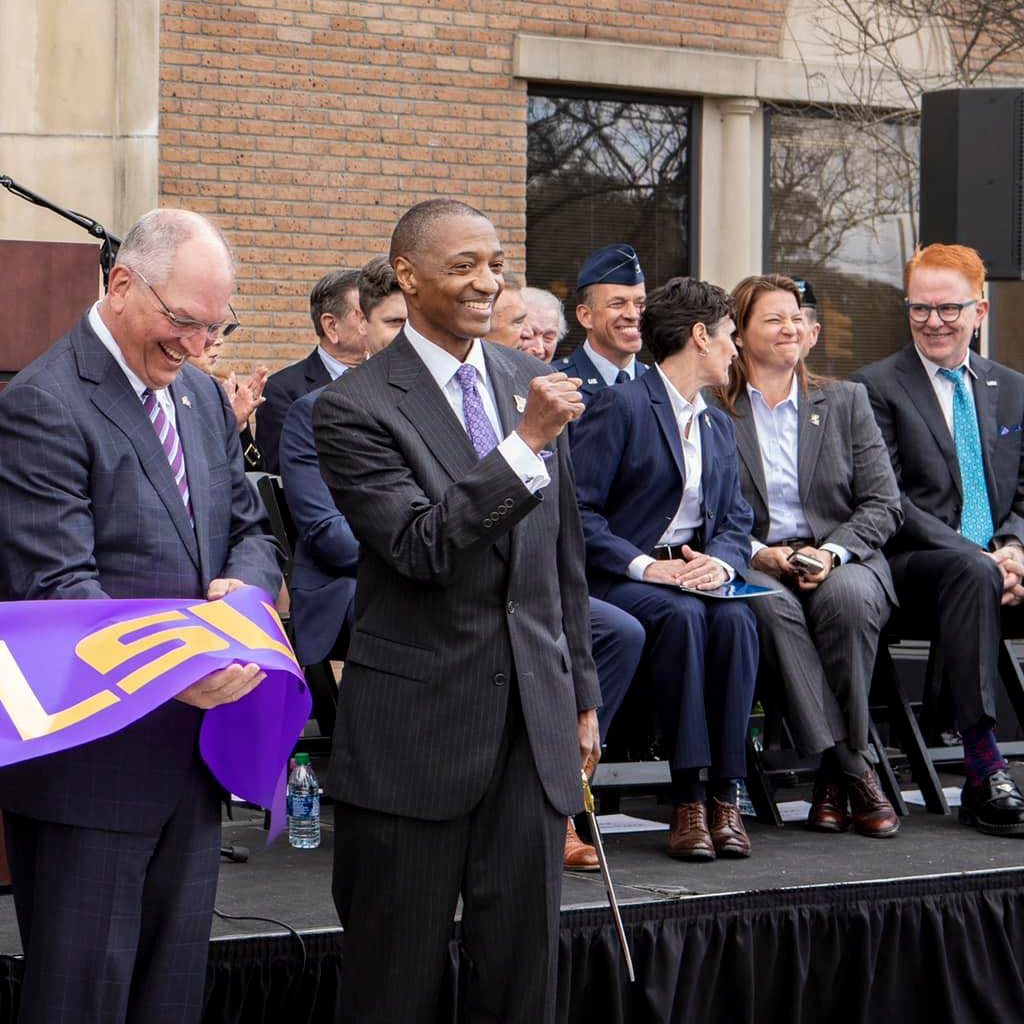LSU Names Professor Golden Richard Interim Director of the LSU Cyber Center
August 23, 2023

Golden Richard, at right, next to Tara McLeese, resident agent in charge of the U.S. Secret Service in Baton Rouge, and Leslie Pichon, special agent in charge of the U.S. Secret Service field office in New Orleans, behind LSU President William F. Tate IV and Louisiana Governor John Bel Edwards as a cannon fired during the March 2022 LSU announcement of the university’s commitment to become a leader in cybersecurity and defense.
Richard spearheaded LSU’s successful pursuit of NSA designation as a National Center of Academic Excellence in Cyber Operations in 2022. The LSU Cyber Center will support projects and programs across disciplines to help secure people and infrastructure on the new frontier of state and national defense, in alignment with LSU’s Scholarship First Agenda.
Professor Golden G. Richard III, a faculty member in the division of computer science and engineering in the LSU College of Engineering has been named the new interim director of the LSU Cyber Center, originally established in 2015 by the Louisiana Board of Regents as the Transformational Technologies & Cyber Research Center. Richard is also the associate director for cybersecurity at the LSU Center for Computation & Technology, where he holds a joint appointment and runs the Applied Cybersecurity Lab with more than 20 active research students. The LSU Cyber Center reports to LSU’s Office of Research & Economic Development, enabling the center to serve a critical role in supporting the university’s growing leadership in cybersecurity.
Richard, who joined LSU as a faculty member in 2017, has spearheaded several initiatives to elevate cybersecurity research, education and partnerships at the university. He led LSU’s successful pursuit of National Security Agency, or NSA, designation as a Center of Academic Excellence in Cyber Operations, or CAE-CO, in 2022, and is a collaborator in the recently announced LSU Cybersecurity Clinic for small businesses in Louisiana—the first such clinic in the nation to be directly funded by the NSA. Richard also serves as faculty lead for LSU’s CyberCorps/Scholarships for Service, or SFS, program, which receives sustained support from the National Science Foundation, or NSF, and offers selected cybersecurity students free tuition plus generous scholarships in return for some government service after graduation. In addition, he is the faculty liaison for several LSU partnerships with industry and government agencies, including the U.S. Secret Service.
The appointment of Richard as interim director of the LSU Cyber Center reflects the university’s commitment to educating the best cybersecurity talent in alignment with LSU’s vision for Scholarship First, said LSU Executive Vice President and Provost Roy Haggerty:
“We have quickly grown our number of cybersecurity faculty into a robust group with ongoing collaborations across our campus, making it strategically important to have the LSU Cyber Center coordinate and bring these efforts together,” Haggerty said.
Cybersecurity is a core component of LSU’s Scholarship First Agenda and part of its defense priority for research, education and service. Beyond defense, the university is also making strategic investments in agriculture, biomedicine, coast and energy to help solve pressing problems in Louisiana—all of which face cyber challenges.
“Cybersecurity is a high research priority for several federal agencies that also cuts across all of LSU’s priorities for research,” said Robert Twilley, vice president of research and economic development at LSU. “This Board of Regents-recognized center helps us focus our talent in multiple disciplines to provide the solutions and the expertise that are most needed by the federal government and businesses around the world.”
There is increasing overlap between cybersecurity and other priority areas in research at LSU. Cybersecurity matters to farmers, who are increasingly data-driven in their management of crops. It also matters in the protection of sensitive health information and in critical infrastructure, including the operation of ports, refineries and chemical manufacturing plants. As interim director of the LSU Cyber Center, Richard looks forward to interlacing these seemingly disparate research and service areas under one roof to build a better-connected cyber research community for LSU faculty in multiple disciplines, colleges and schools.
“As we continue to grow LSU cyber initiatives, we’re working more and more with different units across the campus, including the law school and business school, which are both part of the LSU Cybersecurity Clinic,” Richard said. “But that’s not all. We’re also collaborating with faculty members in English, psychology, philosophy and ethics, so it makes sense to share resources and solutions to together go after some really big federal grants.”
“We started from a highly technical core of computer science in building cyber at LSU, but cybersecurity is inherently interdisciplinary,” Richard continued. “It’s about people and human behavior and one of the things I look forward to the most is to use the LSU Cyber Center to further improve the educational experience in cyber at LSU for our rapidly growing body of students.”
Over the past five years, LSU’s computer science program has grown from being the sixth most popular program in the College of Engineering to the second most popular (after mechanical engineering), going by spring enrollment numbers. This increase in popularity is largely driven by LSU’s rapid strides in cyber, said Greg Trahan, director of economic development at LSU and special advisor for cyber initiatives to President Tate:
“Within the Scholarship First Agenda, cybersecurity is the one domain that impacts and influences all of the others, from agriculture to energy,” Trahan said. “LSU is on a path to become one of the nation’s most important cybersecurity schools because of our ability to connect cyber to all other disciplines, and the LSU Cyber Center and Dr. Richard’s work are essential to that effort.”


